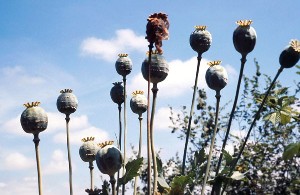The US government has given up for now on efforts to persuade the Afghan government of President Hamid Karzai to allow aerial spraying of the country's opium poppy crop, Reuters quoted a senior US government official as saying Wednesday. The US State Department and Office of National Drug Control Policy (ONDCP) had pushed hard for spraying, but ran into opposition not only from the Afghans, but also from the US's European allies and even other parts of the US government, including the Congress and the Pentagon, which fears such an effort could backfire and drive Afghans into the waiting arms of the Taliban.

Instead of aerial spraying of herbicides, Schweich said, the US will rely on ground eradication. A ground eradication program this year managed to eradicate only 9% of the crop, according to the United Nations.
"That program is going to continue," Schweich said. "It got about 15-16,000 hectares last year. We didn't think it was enough so we are going to monitor very closely whether it is down equitably," he said, adding that there are signs some powerful figures in Afghanistan are using their positions to ensure their fields are not targeted.
Afghanistan produced 93% of the world's opium supply this year, according to the UN Office on Drugs and Crime in a report released last month. In addition to finding their way into the pockets of corrupt government officials and poor Afghan farmers, profits from the opium trade have also fueled the Taliban insurgency, leaving Western policy-makers with a real dilemma: Do they crack down on opium and drive farmers into the hands of the Taliban or do they turn a blind eye and watch opium profits buy shiny new weapons for the Taliban? Prohibition appears to have created a lose-lose situation for the West.
This work by StoptheDrugWar.org is licensed under Creative Commons Attribution-ShareAlike 4.0 International
Add new comment